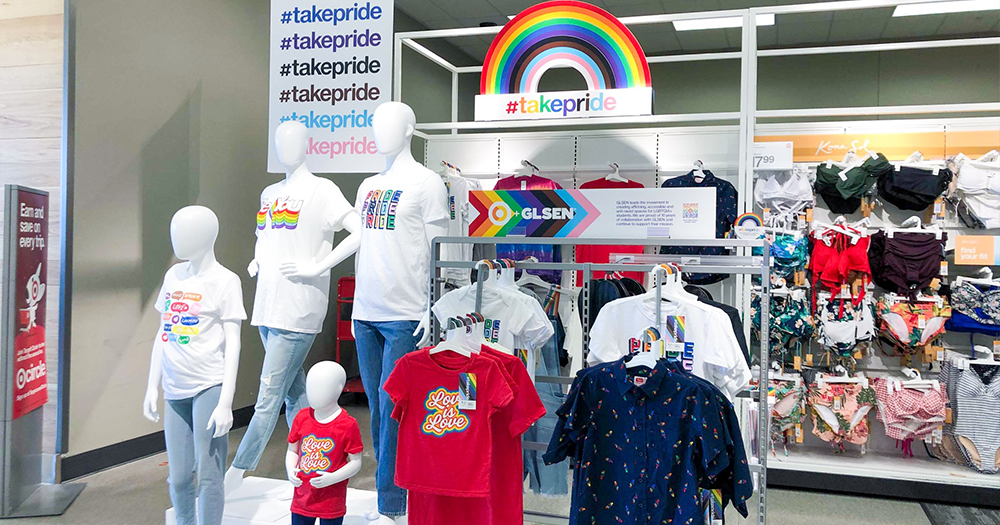How can we tell Pride month is creeping up around the corner? We check Twitter.
As spring fades into summer and all of a sudden June has arrived, brands battle it out in a bid to become the first to embrace a rainbow-coloured profile photo change. From fast fashion giants to weapons manufacturers, showing solidarity with the LGBTQ+ community through a brief icon update has become standard practice during Pride season and is just one example of performative allyship and so-called ‘pinkwashing’.
But what exactly is pinkwashing? According to Dictionary.com, “Pinkwashing is a critical term used to refer to the practice of attempting to benefit from purported support for LGBTQ+ rights, often as a way to profit or to distract from a separate agenda.”
You have probably seen or been a victim of the pervasiveness of pinkwashing. From heart-tugging but ineffective social media campaigns to retail chains lining their window displays with Pride flags and corny t-shirts, it’s difficult to escape the performative allyship hole, especially in June.
These displays of “support” for the LGBTQ+ community may seem harmless and some may argue that any exposure is good, but the issue runs deeper. Many companies or organisations that participate in this performative allyship do so for their image; some may even actively participate in harming LGBTQ+ and other marginalised people.
H&M’s yearly Pride collections are a perfect example of this. In 2022, the retailer’s campaign was called My Chosen Family. A chosen family is a general concept — electing people to play significant roles in your life — but chosen families are essential for the queer community, particularly if an LGBTQ+ person is ostracised by their blood relatives.
From the outside, H&M’s campaign may seem heartwarming, shedding light on a distinctly queer experience, but a closer look reveals more. Despite the company’s supposed support for and solidarity with the LGBTQ+ community, it primarily uses clothing suppliers in China, Bangladesh and Turkey. Respectively, these countries have various forms of anti-LGBTQ+ legislation in place, and queer communities in these countries face various amounts of discrimination.
Another “friend” to the queer community during Pride month is the United States Marines, who last June tweeted an image of a military helmet with rainbow-coloured bullets.
Throughout June, the USMC takes #Pride in recognizing and honoring the contributions of our LGBTQ service members. We remain committed to fostering an environment free from discrimination, and defend the values of treating all equally, with dignity and respect.#PrideMonth #USMC pic.twitter.com/MOyvFmyJiB
— U.S. Marines (@USMC) June 1, 2022
Wow, what an ally. Except, is it really allyship if it’s one of the most notoriously homophobic and toxically masculine institutions? And do we want an ally in the form of a war-mongering institution that benefits from the overseas deaths of non-white people?
Pinkwashing doesn’t just stop at organisations and institutions. Nations are also very capable of using LGBTQ+ “allyship” for their benefit.
Take Japan and the 2021 “unity diversity” Olympics, for example. The Tokyo Games branded itself as inclusive and pushed diversity to the front. While there were some positives, like having the first transgender board member of the Japan Olympic Committee, the country’s inclusivity still falls flat in its politics.
Same-sex marriage is still denied to gay couples in Japan and so is same-sex adoption. Activists are calling on Japan to better recognise LGBTQ+ rights, and a court recently ruled that the nation’s ban on same-sex marriage is unconstitutional.
Support without action is just empty words, and Pride month is precisely when those actionless “allies” come to light. That’s why, if you are looking to avoid organisations guilty of pinkwashing and performative allyship in favour of those who actually mean what they say, be sure to do your research!
© 2023 GCN (Gay Community News). All rights reserved.
Support GCN
GCN is a free, vital resource for Ireland’s LGBTQ+ community since 1988.
GCN is a trading name of National LGBT Federation CLG, a registered charity - Charity Number: 20034580.
GCN relies on the generous support of the community and allies to sustain the crucial work that we do. Producing GCN is costly, and, in an industry which has been hugely impacted by rising costs, we need your support to help sustain and grow this vital resource.
Supporting GCN for as little as €1.99 per month will help us continue our work as Ireland’s free, independent LGBTQ+ media.
